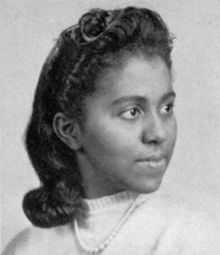42 Marie Maynard Daly
Mary Maynard Daly |
 |
Time period:1921-2003 Subject:Biochemistry |
|
Biography:Marie Maynard Daly was an African-American biochemist, and the first African-American woman to earn a Ph.D. in chemistry. She was born in 1921, in Queens, New York, U.S., to a family who placed much value in education and was very supportive of her academic aspirations. Dr. Daly earned her B.Sc. in chemistry from Queens College in 1942, and her M.Sc. in chemistry from New York University the following year. She went on to pursue a Ph.D. at Columbia University, where she work in the laboratory of Mary Caldwell–a chemist and the first female assistant professor in Columbia’s Graduate School of Arts and Sciences. She graduated with her Ph.D. less than three years later After completing her postdoctoral, she spent some time teaching physical science at Howard University before joining the lab of molecular biologist Alfred E. Mirsky, studying the cell nucleus and the metabolic processes within it. In 1955, she returned to Columbia University to teach biochemistry and research at the College of Physicians and Surgeons. Dr. Daly became an investigator for the American Heart Association in 1958, then left her position two years later to join the faculty at Yeshiva University as a professor of biochemistry where she worked until her retirement in 1986. Dr. Daly was a member of the Phi Beta Kappa Society and a fellow of the American Association for the Advancement of Science. |
|
Summary of their contributions:Dr. Daly primarily helped advance the molecular biology, cell metabolism, and cardiovascular disease fields. Her research focused on the composition and function of histones, the proportions of purines and pyrimidines in nucleic acids, and the role of RNA in protein synthesis. During her time working at Columbia University, she, along with Dr. Quentin B. Deming, investigated the causes of heart attacks and revealed the relationship between high cholesterol, hypertension, and clogged arteries, furthering scientists’ understanding of the impact of foods and diet on cardiovascular health. Dr. Daly also conducted research on the amino acid creatine, a key part of the energy recycling process in muscles, and analyzed the effect of cigarette smoke on respiratory health. Throughout her career, Dr. Daly advocated for minority students in science, encouraging them to enroll in medical schools and graduate science programs. She started a scholarship for minority students hoping to study science at Queens college in 1988, in honour of her father who was unable to finish his own chemistry undergraduate studies due to financial concerns. |
|
Integration with the BC Secondary Science Curriculum:Dr. Daly’s work in cell biology and cardiovascular health connect well will the BC Anatomy and Physiology 12 curriculum, particularly the topics of biological molecules, protein and their relationship to the structure and function of cells, and lifestyle differences and their effects on human health. In terms of curricular competencies, Dr. Daly is a prime example of demonstrating a sustained intellectual curiosity about a scientific topic or problem of personal, local, or global interest. Her research on the cause of heart attacks and the connection between cholesterol and blood pressure–both individually and in collaboration with other fellow scientists–not only evidences seeking and analyzing patterns, trends, and connections in data to describe relationships between variables, but also contributed to care for self, others, community, and the world. |
|
References:Biography.com. (2021, January 12). Marie M. Daly biography. The Biography.com website. https://www.biography.com/scientists/marie-m-daly Dubey, A. (2024, October 24). Marie Maynard Daly. Encyclopedia Britannica. https://www.britannica.com/biography/Marie-Maynard-Daly |
|

